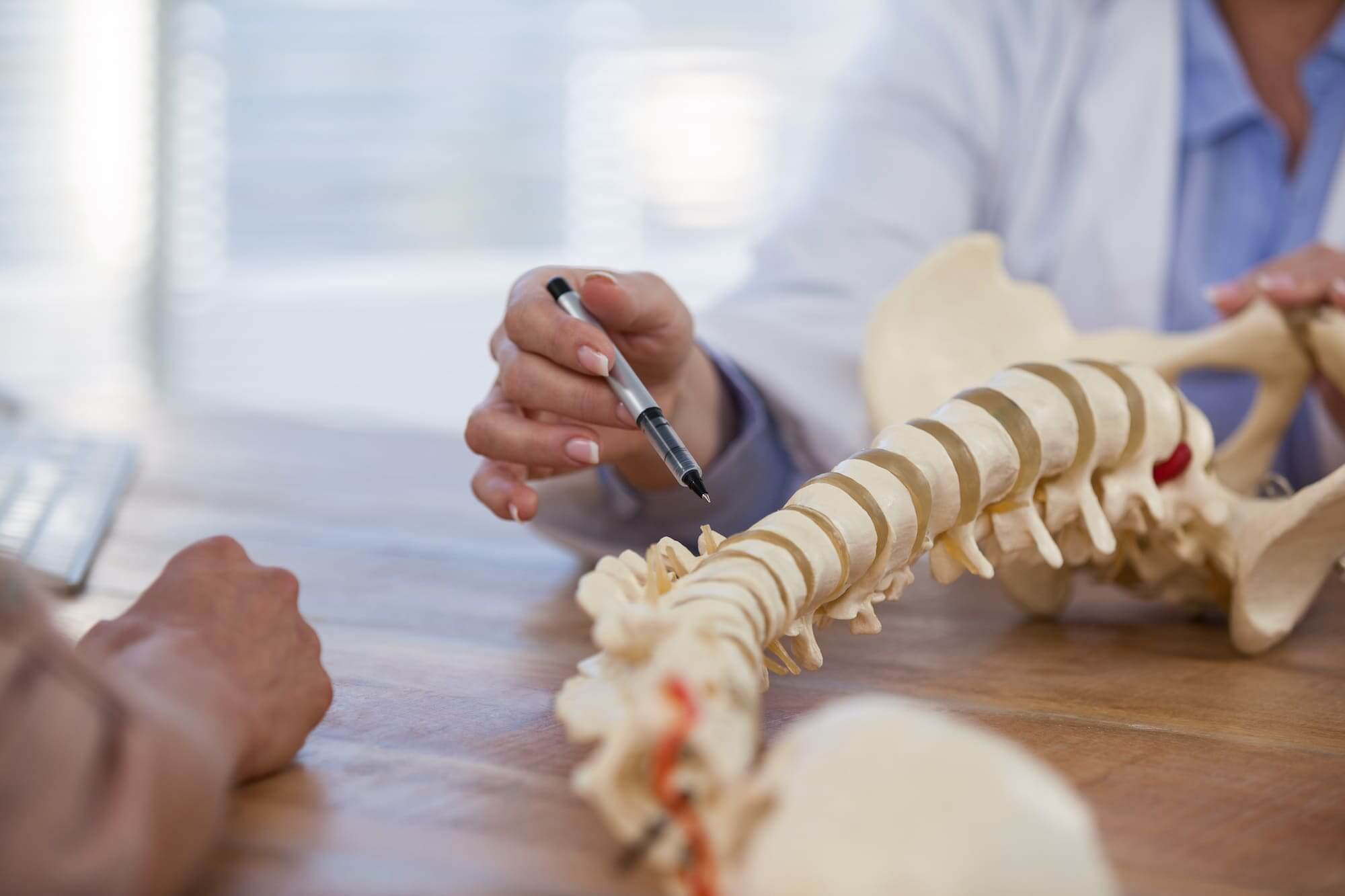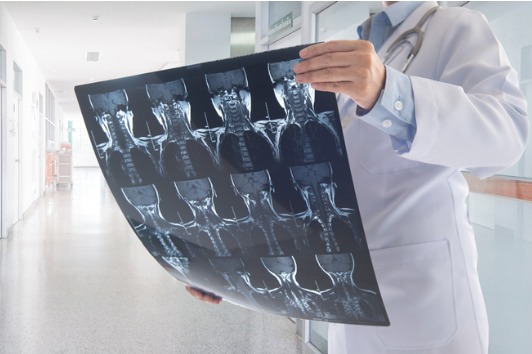Radiculopathy & Pinched Nerves
Understanding the Symptoms, Causes & Treatments of Radiculopathy and Pinched Nerves
What is Radiculopathy?
Radiculopathy refers to damage or irritation of nerve roots that exit the spine. This is commonly referred to as a “pinched nerve.” At each vertebral body level in the spine, a nerve exits and travels in a specific path to skin and muscles. In the low back this nerve travels to the leg, in the cervical spine it travels to the arms, and in the thoracic spine it travels to the chest. Generally, these patterns are the same for all people although there can be some slight variation. We refer to this specific map of nerves as dermatomal patterns.

Understanding Radiculopathy (Pinched Nerves)
Radiculopathy is an irritation on a nerve. This can occur in the cervical, thoracic, or lumbar spine. If the irritation occurs in the cervical spine (neck) often patient’s feel symptoms extending into one or possibly both arms. If this occurs in the thoracic spine (mid back) symptoms often wrap around to the chest. If the irritation occurs in the lumbar spine (low back) the symptoms refer into the legs and sometimes groin area.
Nerves are responsible for these three main functions: pain, sensation and strength. Pain is usually the first sign of nerve irritation and may be felt many different ways such as a deep, dull, and achy pain or a sharp, shooting pain along the path of the nerve affected. Sensation changes tend to occur first as pins and needles or tingling and can progress to radiating numbness. Strength changes may be subtle in certain muscle groups or be quite noticeable. Because the nerves are responsible for these functions, compression (or ‘pinching’) of a nerve may result in pain, sensation changes, or weakness at different locations on your body.

What Are Common Radiculopathy Symptoms?
When the compressed nerves start to lose blood supply, an inflammatory cascade happens. This leads to the following radicular pain and discomfort:
- Pinched Nerve in Neck
- Pinched Nerve in Back
- Pinched Nerve in Lower Back
- Pinched Nerve in Shoulder
- Pain and Burning Sensation in Arms and Fingers
- Pain and Burning in the Lower Back, Buttocks, and Legs
- Weakness
- Numbness
- Tingling
When to Seek Help for Pinched Nerve Symptoms?
If you’re noticing symptoms associated with Radiculopathy or a pinched nerve and suspect a spinal issue, it’s crucial to consider consulting a board-certified spinal specialist. Reach out promptly to a certified spine surgeon for an accurate diagnosis and timely treatment. Early intervention can significantly improve your overall well-being and provide a broader range of treatment options, which may decrease as symptoms persist. The key to a successful and speedy recovery lies in addressing the root of the pain with your spine specialist as soon as symptoms arise.
While many people experience day-to-day back or neck pain, dismissing it as soreness, this may not be the case for everyone. If your pain persists for more than 10 days, it should be taken more seriously. Evaluate such prolonged pain with a spine surgeon to identify the root issue and determine the appropriate treatment. Additionally, be attentive to other signs related to back or neck pain that should not be ignored, including pain accompanied by fever, pain associated with loss of bladder control, and weakness/tingling/numbness in your arms or legs.
It’s important to note that these are general guidelines based on our expertise in spine care over the past three decades, recognizing that each patient’s symptoms may be unique.


What Are Common Causes of Radiculopathy?
Nerve roots that exit your spine can be compressed in several ways. Degeneration of the discs in the spine or bone spurs associated with arthritis can both cause these symptoms of radiculopathy.
- Disc herniation: A disc herniation occurs when a tear in the outer ring of the disc, called the annulus, allows central disc material, called the nucleus, to squeeze through the tear. An annular tear (link word) can happen at any place in the outer ring of the disc. The spinal canal is home to the spinal cord and surrounding nerves, when there is extra material not typically in that space it can place pressure on the nerves causing symptoms. The disc material itself is very acidic and with a tear and associated release of chemicals it causes significant irritation and inflammation on surrounding nerve roots, leading to radiculopathy.
- Bone Spurs: Bone spurs form over time in response to arthritis or degenerative changes. Bone spurs can occur anywhere on the bone. When they form inside the foramen (or hole) where nerves exit through, this reduces the normal space available for a nerve root to “live” and causes irritation to the nerve. We call this foraminal stenosis. A nerve root being pinched by a bone spur can cause the same symptoms as a herniated disc since both processes can cause nerve irritation as the nerve exits the spinal canal.
How Are Radiculopathy & Pinched Nerves Diagnosed?
Usually, a careful physical examination will identify the source of the symptoms. At your initial consultation your spinal specialist will perform a thorough history and comprehensive physical exam to understand your condition. Your exam includes neurologic tests to assess for any sensory changes, strength changes, reflex abnormalities and specific tests will be done which may reproduce your pain. Certain exam findings may show the cause of your symptoms and identify which nerves are involved. In addition, diagnostic tests are also used to fully evaluate a patient’s spinal anatomy. These diagnostic tests may include x-rays, MRI scans, and/or EMG testing of your extremities. Which studies are ordered are determined through your history and physical exam.


What Are Common Treatments For Radiculopathy and Pinched Nerves?
- Medication: Medications are commonly used to reduce inflammation, control pain, and manage any resulting muscle spasms. You may be prescribed a short course of oral steroids to reduce inflammation and/or NSAIDs (non-steroidal anti-inflammatory drugs), both of which are very effective in reducing overall inflammation.
- Physical Therapy: Spine-focused physical therapy is used to assist in calming pain and inflammation, increasing mobility, and improving stability and strength. Skilled physical therapists use many different modalities for spinal rehabilitation including cervical traction, manual manipulation, ultrasound, electric stimulation and dry needling.
- Steroid Injections: When oral medications are not effective or symptoms are severe enough, a steroid injection can be used to effectively control pain afnd inflammation. The steroid injection delivers targeted steroid medication directly to the affected site and can provide short-term to lasting relief. At VSI, the needle placement for steroid injections is guided by x-ray to ensure correct placement.
- Radiculopathy Surgery: Surgery may be recommended if pinched nerves symptoms have not responded to conservative therapy or there is significant or dangerous neurological damage. Surgery is done to remove a portion or all of a damaged disc and free up any narrowed space for the nerves. If surgery is needed, your spine surgeon will discuss which surgery is most appropriate for you. Some of the common surgeries used to treat Radiculopathy are:

